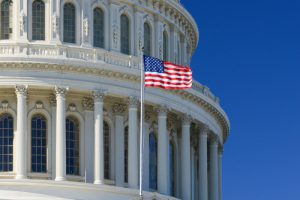
With the fiscal year (FY) 2018 omnibus budget barely a fading spring shadow and upcoming midterm elections just months away, U.S. Rep. Steve Womack (R-AR) and the U.S. House Budget Committee he oversees are now turning their focus to crafting a budget resolution for the upcoming fiscal year.
The Congressional Budget Office (CBO) has released its Budget and Economic Outlook for 2018 to 2028, which details the nation’s current fiscal challenges and guides lawmakers in mapping out a sustainable economic path, said Rep. Womack, chairman of the House Budget Committee.
“Without question, we have challenging work ahead,” the congressman said on April 9 following release of what is commonly referred to as CBO’s baseline report providing the agency’s economic and budget projections.
Release of CBO’s baseline also signals that the House Budget Committee now may proceed in drafting a FY 2019 budget resolution, Womack said, adding that CBO Director Keith Hall is scheduled to testify before the panel during an April 12 hearing to discuss the agency’s baseline report.
“It is particularly sobering that mandatory spending continues to grow at such an unsustainable pace, making it even more difficult to achieve balance,” noted Rep. Womack.
In an April 9 statement on the release of the CBO’s baseline report, Hall said the nation’s “deficits and debt are projected to be large by historical standards.”
The 2018 deficit will total $804 billion, $139 billion more than the $665 billion shortfall recorded in 2017, Hall said, and CBO projects budget deficits to continue increasing after 2018.
“As deficits accumulate, debt held by the public rises from 78 percent of GDP (or $16 trillion) at the end of 2018 to 96 percent of GDP (or $29 trillion) by 2028,” he said. “That percentage would be the largest since 1946 and well more than twice the average over the past five decades.”
Outlays will be approximately 21 percent of GDP over the next three years, higher than the 20.3 percent average over the last 50 years, added Hall, who said the agency also expects outlays will outpace economic growth in years ahead.
“That increase reflects significant growth in mandatory spending — mainly because the aging of the population and rising health care costs per beneficiary are projected to increase spending for Social Security and Medicare, among other programs,” said Hall, adding that it also reflects a significant growth in projected rising interest costs that result from rising interest rates and mounting debt.
By 2028, CBO forecasts net outlays for interest to be about triple what they are this year in dollar terms and roughly double when measured as a percentage of GDP, he said. “In contrast, discretionary spending is projected to decline in relation to the size of the economy.”
CBO also forecasts that the cumulative deficit will be $1.6 trillion more than the $10.1 trillion deficit CBO projected for 2018-2027 last June, according to Hall, who said laws enacted since then are expected to add $2.7 trillion to the deficit, but CBO projects economic growth will offset a portion of that amount.
“Revisions to our economic projections caused us to reduce our estimate of the cumulative deficit by $1 trillion over the same period, mainly because of expectations of faster growth in the economy and in wages and corporate profits,” said Hall.
Rep. Womack said he looks forward to discussing CBO’s findings with Hall and on working with his House Budget Committee colleagues to craft a responsible budget resolution.



